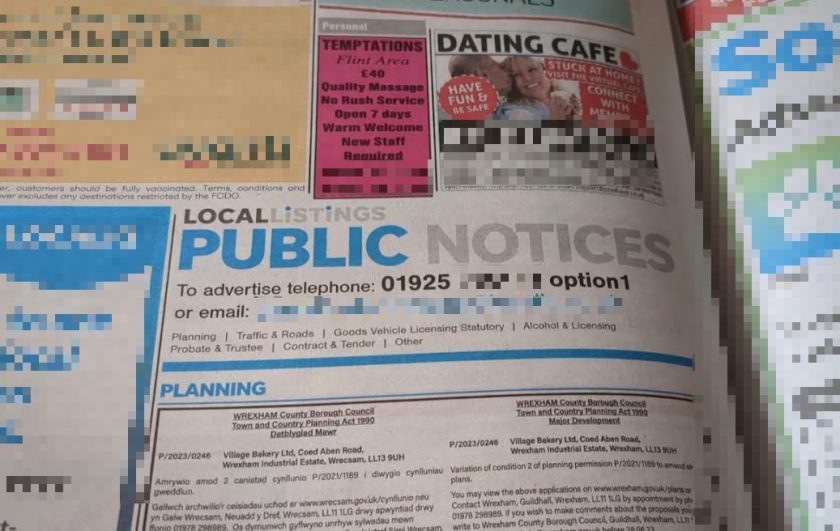Local government slowly waking up to newspaper circulations that have plummeted – and face new epiphany over online content

Local governments are slowly waking up to changes to how people consume media and the continuing decline in newspaper circulations.
Wrexham Council’s Standards Committee last week had the chance to discuss how it should respond to a consultation paper issued by the Welsh Government with their proposals for implementing the Penn Review.
Richard Penn has reviewed the Ethical Standards Framework in Wales, and found the framework was fit for purpose but that some areas may benefit from future amendments.
One such question around how things are done in future was,:” Advertising for independent members of standards committees: Do you agree the requirement to advertise vacancies for independent members on standards committees in newspapers should be removed?”
Wrexham Council’s Chief Legal Officer advised councillors: “Currently, the legislation says, when we have a vacancy for independent member, we must place an advert in two newspapers that circulated in the area.
“Now, the issue with this is that obviously, there is now limited circulation of paper newspapers in areas, and a lot of authorities are reporting that actually, they don’t get a lot of feedback from that type of advertising.
“But, when they promote it through their digital means, and put it on their websites and promote it through social media, that’s how they get a lot of responses.
“So there’s a cost implication there for councils because the we have to fund and pay for those adverts every time.
“And that relatively insistence on that is not producing a lot a great deal of applications. There’s much of a wider sources now that are producing more applicants coming in.
“So I’d say that question first of all, is should the requirements to advertise in newspapers be removed?”
Cllr I David Bithell explained how he like many no longer got a local newspaper, and would prefer a digital approach involving existing council resources.
He said: “It could be advertised on the Wrexham Council website, because most people go into that, whether they’re complaining or looking to contact the department.”
Mrs Sandra Hunt said she saw an advert in a traditional legacy print product several years ago, however “I think things have moved on a lot since then”.
She added: “I agree with David Bithell MBE that it is a good idea to advertise it on the council website, or perhaps on Facebook, something like that, which would bring in perhaps all ages of individuals rather than just one particular age”
Mrs Elizabeth Granger opened a can of worms over print v online noting ‘most newspapers are online now’ and pondering, “do we really mean not advertising in newspapers? Or do we mean, not advertising in print? ”
The Legal Officer gave more information to the committee from feedback across Wales: “The current requirement is that we have to advertise in print, because it’s newspaper circulating in an area.
“The general view and from talking to, for example, Monitoring Officers across Wales, is that authorities would like the choice to then choose within their areas as to what’s the most suitable medium to use.
“Some might say, well, actually, at the moment, we’ve still got a local newspaper that has a high circulation, so we would still use that.
“But, it’s better to have a choice.
“We know ourselves, we have channels on a lot of social media channels, LinkedIn as well where you can attract professionals or others who might work in certain fields.
“We have connections with different community groups as well that we could use to broaden the range of potential applicants.”
“At the moment the only requirement is advertising to print newspapers as the legislation doesn’t say anything else, but I think the review is looking at removing that to then leave it flexible for authorities to to promote in the best ways they can with the local knowledge of in their area.”
Committee Chair Mr Neil Benson noted his “background largely in local papers”, giving some further detail to his viewpoint: “I am being careful here not to be partisan about it but I guess some of the questions around this have surfaced over the years in regards to public notices – about councils not liking being bound by that sort of obligation to advertise in the in the regional papers.
“I’m not going to try and pitch to you here but just a bit of data that might be helpful. The typical weekly, and daily, regional papers, you are right the circulations have dropped dramatically in the last 10-15 years. But, their web audiences have grown dramatically as well.
:I think it’s fairly typical now that, I cant speak for the papers in our area, but speaking broadly across across the UK, around 10 to 20% of the total audience these days comes from print, and the other 80 to 90% comes from their digital offerings.
“So, that might be something sort of worth considering in all of this.
“They actually probably reach more people in the area in a month than certainly they have done in my 40 odd years working in the industry.
“The interesting thing I think, is that the cost of advertising online is far lower than then traditionally has been in print. So that’s just a bit of context.
“It is small thing, and it’s a decreasing number, I guess the number of non internet users now in across the UK is somewhere around 5% or 6%.
“So it’s a small and decreasing number, but it’s also a part of the community that sometimes gets forgotten in terms of the move towards digital.”
The Legal Officer noted all the feedback, adding: “I think my view would be that the requirement to advertise in the newspaper has now, as you say, it’s a fairly limited number who will actually buy a newspaper, but then also even read an advert that’s perhaps on the back page and then apply.
“So I think we can promote it in lots of other ways to widen participation.”
Wrexham Council’s silence over statutory notice ad spend
In 2019 Wrexham Council’s Chief Executive Ian Bancroft told Wrexham.com there would be a ‘trigger point’ on circulations where statutory notices would no longer be placed in newspapers – at the time Standards Committee adverts were costing around £350 a pop. We asked several times for more details on what that ‘trigger point’ would be, with no response.
In February this year we were pointed to the latest ABC circulation certification for ‘The Leader’ product used by Wrexham Council for such notices, with the circulation stated then as just 2,236 for Wrexham. We asked again if there was any indication what the trigger point would be.
A FOI revealed the ongoing spend for such advertisements (as filtered by Wrexham Council)
Vendor Name 2019 2020 2021 2022 (to June)
NEWSQUEST MEDIA GROUP 28,118.62 40,907.09 54,476.10 35,448.60
In March we re-asked Wrexham Council, and with such a large spend if they had any warm words on how it is still a useful relevant value for money tool for WCBC to communicate to the people of Wrexham. We had no reply.
Earlier this month we pointed to some press release material from Wrexham Council that sung the praises of digital signage to be placed around the city, along with the benefits of social media.
We asked why there was the reluctance to give a similar ringing endorsement for promotion that is already in operation, being paid for, and being used to communicate important stuff to the public.
We included a picture of a statutory notice from that day, buried in the back of a print newspaper in prime place below the massage parlour adverts.
Finally after years waiting, a spokesperson for Wrexham Council said: “Councils across Wales are required to publish public notices in newspapers circulating in the area. This is not unique to Wrexham and every council is required to do this.
“Other forms of advertising are used, but this is at the council’s discretion and is often dependent on budgets and other factors.”
“Finally it’s there in black and white – Reach PLC and others have turned local newspaper sites into SEO eyeball farms” – Joshi Herrmann from the Manchester Mill
The Chair of Standards referred to the move online by newspapers, and the apparent move of local relevant audiences as well.
Data released last year answers that question, “But how much of the traffic to local news sites is really local?”
This is relevant for those placing adverts as traditional logic is local people, and their eyeballs, read local titles and the content they write, however that is not always the case.
In the modern online world content drives traffic, not the masthead.
Ad agencies will say they can geo target advertisers via technology, usually IP based fencing. In practice that is very tricky, for example the Wrexham.com office would look like it is in London. More and more devices and systems also block any data leaks to allow tracking.
Data from trade publication Press Gazette.co.uk breaks it down more.
‘Most website traffic is non-local for biggest UK regional news brands’ wrote Press Gazette presenting a range of Reach PLC titles. Wales’ WalesOnline and Daily Post are not in the list but several are with what you (and us!) imagined would be strong local brands and titles – the Liverpool Echo and Manchester Evening News.
Press Gazette reported:
- 46% of South Wales Argus traffic is not from a ‘main local region’.
- Liverpool Echo – just 18% of its audience came from the north-west ITV region where the city is located
- Manchester Evening News (MEN) – just 17% of visitors were from the north-west
- Bristol Live – Just 14% of visitors came from the west
- Devon Live – Just 10% of visitors came from the south-west
- “Other sites such as MyLondon had a reach of 24% in London – yet is drawing in over two thirds of its audience from elsewhere”
Press Gazette found “Overall across our list of sites, the average share of UK audience drawn from the local region was 36%.”
Generic non-local content with titles such as “What time is the World Cup Final”, “Where can I stream Manchester United?”, “When do the clocks go back” attract traffic, so much so there are dedicated writers and teams on topics circulating content out to ‘local’ publications.
Try some generic searches, this is just the easy to find stuff:
https://www.google.com/search?q=site%3Awalesonline.co.uk+%22who+is%22&
https://www.google.com/search?q=site%3Awalesonline.co.uk+%22how+old%22&
https://www.google.com/search?q=site%3Awalesonline.co.uk+%22what+can%22&
https://www.google.com/search?q=site%3Asouthwalesargus.co.uk+%22what+time%22&
https://www.google.com/search?q=site%3Asouthwalesargus.co.uk+%22when+is%22&r
The SEO farms have editor pages, such as this for Newsquest’s ‘trending’ editor – which showcases the current live content being shared to Newsquest sites across the UK right now.
James Ball, global editor of The Bureau of Investigative Journalism wrote in Press Gazette’s sister title New Statesman recently:
“Local papers often jump to the top of Google’s results for stories that could run anywhere. They have no relevance or tie to the community the paper ostensibly serves… A journalist who is worried about their traffic targets could face the decision about whether to write up a meeting of the town council’s planning committee about a major new housing development — of huge interest to actual local readers — or whether to write up a Twitter fight that could get higher national traffic.”
Spotted something? Got a story? Email [email protected]












